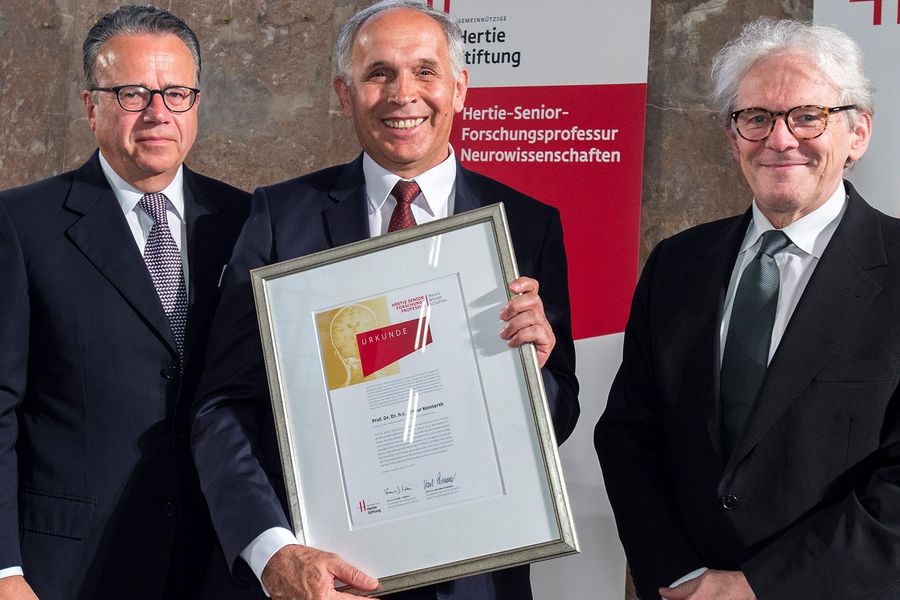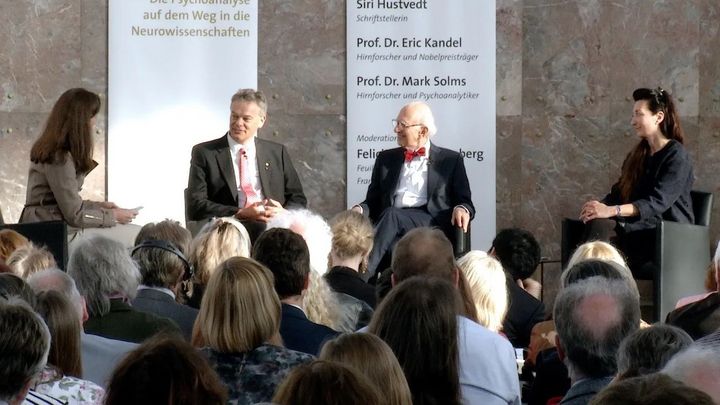The Hertie Senior Research Chair for Neuro-sciences is addressed to outstanding researchers in neurology ages 60 and over who want to dedicate the final years of their professional careers exclusively to research. The Hertie Senior Research Professorship is aimed at outstanding neuroscientists aged 60 and over who want to devote their final years to research.
The Model of the Endowment Chair
The Hertie Senior Research Chair for Neuro-sciences is addressed to outstanding researchers in neurology ages 60 and over who want to dedicate the final years of their professional careers exclusively to research. It is at the same time a recognition of years of top performance of experienced researchers in the field of neurology. It has funding totaling 1 million Euros over a term of at most eight years and is based on the current salary of the candidate (including benefits for pension claims, health insurance etc.).
The person who is granted the endowment chair undertakes to retire from all management responsibilities (management of a clinic, a CRC etc.) when they accede to the research chair and they shall receive working conditions (laboratories, research budget etc.) as they require and in coordination with the University over the full term. Furthermore, a supplement is possible for extraordinary research efforts, specified as a service agreement between the person in the endowment chair and the Hertie Foundation. The location in which to establish the endowment chair can be chosen freely.
The Hertie Senior Research Chair in Neuro-Sciences is under the patronage of the Ministry for Education and Research.
Motivation: Maintaining the Potential of Experienced Researchers
The goal of the endowment chair is to maintain, promote, and publicize the very high research potential of older researchers: researchers over 50 very rarely still receive tenured professorships. However, Europe and Germany are increasingly dependent on the potential of older researchers for reasons of demographic change alone. And they are the ones with the specific skills and experience – for instance in assessing applications to see whether the research objectives can be realized.
There is a number of top-class researchers who are achieving outstanding research past the age of retirement. Just to name one example, the 88-year old American Nobel laureate Dr. Eric Kandel who still works in his laboratory. Consequently, US research institution increasingly attract outstanding European and German researchers to their institutes after they retire here – highly motivated researchers who appreciate being able to spend all their time exclusively on their research.
Overview of All Endowment Chair Holders
Dr. Arthur Konnerth (born in 1953) studied medicine at the Ludwig-Maximilians University Munich (LMU), received his doctorate in 1983 at the MPI for Psychiatry in Munich, and qualified as a professor in 1987 at the Technical University Munich (TUM). After scientific sabbaticals in the USA and at the MPI for biophysical chemistry in Göttingen, he became Professor of Physiology at the University of the Saarland, the TUM, and the LMU. Since 2005 he has been the Friedrich-Schiedel Professor and Director of the Institute for Neuro-Sciences at the TUM.
By awarding the endowment chair to Dr. Arthur Konnerth, the Foundation honors the life's work of an outstanding neuro-scientist and his contributions to research in the area of visualization and functional characterization of individual neurons and synapses in the mammal brain. With the endowment, the Foundation makes it possible for him to continue and intensify his high-quality and promising research in the area of neurophysiology and in particular his Foundational research of Alzheimer’s disease.
Dr. Peter Hegemann, born in 1954 in Münster (Westphalia), studied chemistry at the University of Münster and the Ludwig-Maximilians University Munich. He received his doctorate at the Max Planck Institute for Biochemistry in Martinsried and then performed research for two years at the Physics Department of the Syracuse University (USA). After this, he headed his own research group at the Max Planck Institute in Martinsried and became a professor in 1992 at the Ludwig-Maximilians University Munich. From 1993 to 2004 he was a Professor for Biochemistry at the University of Regensburg and in 2005 became a professor for experimental biophysics at the Humboldt-University in Berlin. Since 2012 he has also been visiting scientist at the Howard Hughes Medical Institute, Janelia Research Campus (Ashburn), Virginia USA.
Dr. Hegemann is considered one of the co-founders of optogenetics, a still young research branch, which studies controlling genetic changes to cells due to light. Dr. Hegemann's focus lies on the area of experimental biophysics, especially the discovery and characterization of optical switching ion channels (channel rhodopsins) and their use for the characterization of neuron systems (optogenetics). By selecting Dr. Hegemann, the non-profit Hertie Foundation honors his life's work and allows him to continue and intensify his promising research into multi-component optogenetics.
Dr. Wolfgang Oertel (born 1951) studied human medicine at the Free University Berlin. There, he received his doctorate in 1978 with an animal study, before completing a three-year research sabbatical at the Laboratory of Clinical Science, National Institute of Mental Health (Bethesda, USA). Until 1986 he worked as assistant physician at the Neurological Clinic and Polyclinic of the Technical University Munich with the goal of becoming a specialist in neurology. In his postdoctoral thesis written during this time, the summed up his work on GABAergic neurons in the CNS of rats. Until 1990, Dr. Oertel was a Heisenberg scholar with a focus on basic and clinical research on neurodegenerative illnesses. After his time as senior physician at the Neurological Clinic and Polyclinic of the Ludwig-Maximilian University Munich, Dr. Oertel took on the post of Director of the Clinic for Neurology at the Philipps University Marburg in 1996.
By awarding the endowment chair to Dr. Oertel, the Foundation honors the life's work of an outstanding neuro-scientist and his contributions to research in the area of Parkinson's disease. Among other things, Dr. Oertel studied the early phase of the illness by investigating sleep disorders. In addition, he developed a therapeutic research concept that ranges from preclinical diagnostics all the way to disease-modifying therapy development.
Dr. Hartmut Wekerle (born in. 1944) studied medicine at the University of Freiburg, where he received his doctorate in 1971. After that he worked at the Weizmann Institute of Science in Rehovot, Israel. Since 1973, Hartmut Wekerle worked as a research associate at the Max Planck Institute for immuno-biology in Freiburg and since 1982 as Director of the clinical research group for multiple sclerosis at the Max Planck Society in Würzburg. In 1980 he was appointed Professor of Immunology at the University of Freiburg. Since 1988 he has been Director for Neurobiology at the Max Planck Institute in Martinsried.
The research field of Dr. Wekerle includes the causes and mechanisms of illnesses that arise and form a conflict between the immune and the nervous system. He has a clear focus on studying multiple sclerosis with the goal of developing new approaches to treatment. In his research he was the first to demonstrate that certain immune cells can also turn against their own body cells. He was also able to show that it was possible for the cells to overcome the blood-brain barrier and thus also attack nervous tissue.
The Hertie Senior Endowment Chair of Dr. Hartmut Wekerle ended in 2018.
Dr. Fontana (born in 1946) was the Director of the Clinic for Immunology at the university hospital of the University of Zurich. He focused in particular on the study and treatment of inflammatory diseases of the brain and the connections between the immune and nervous systems. A majority of his scientific studies dealt with the body's own, inflammation-modulating messenger substances, the so-called cytokines. In chronic diseases, such as multiple sclerosis, cytokines are discharged and influence the activity of immune cells.
As international expert in the area of neuro-immunology and infectious immunology, Dr. Fontana is among the 100 most cited immunologists in the world. He is a member of numerous neuro-scientific committees and advisory councils, including since 2004 a scientific council member of the Fondation Leenaards and since 2008 a council member of the Foundation Dr. Max Cloëtta.
The numerous honors that Dr. Fontana received in the past include the 1999 German AIDS Research Prize that he shared with three colleagues and the 1997 Hoechst Marion Roussel Multiple Sclerosis Research Prize that he shared with two colleagues.
The Hertie Senior Endowment Chair of Dr. Adriano Fontana ended in 2017.
Dr. Lehmann-Horn (born in 1948 near Nuremberg) was Director of the Institute for Applied Physiology at the Medical Faculty of the University of Ulm and studied various aspects of ion channels. Mutations in ion channel genes can cause diseases such as epilepsy or cardiac arrhythmia. However, the symptoms also include sudden heart failure deaths of professional athletes or lethal anesthesia accidents. Dr. Lehmann-Horn was the spokesperson of the Neuromuscular Center of the University of Ulm and was appointed to numerous directorial functions. He was the director of the International Promotion Program supported by the DFG and DAAD and coordinator of the EU network "ECC and Ca signaling in health and disease". He also receives numerous awards, such as the annual award of the Periodic Paralysis Association and the Art of Listening Award of the Genetic Alliance in Washington, D.C., which marked the first time it was awarded outside of the US.
He was awarded the Hertie Senior Research Chair on June 25, 2008 at the University of Ulm by the Federal Minister of Research, Dr. Annette Schavan.
The Hertie Senior Endowment Chair of Dr. Frank Lehmann-Horn ended in 2016.
Dr. med. Michael Frotscher (born in 1947 in Dresden) was the Director of the Institute for Structural Neurobiology at the Center for Molecular Neurobiology in Hamburg (ZMNH). He moved there from the Albert-Ludwigs University in Freiburg in May 2011. Since the beginning of his scientific work he has been interested in questions about what structures are formed to perform the complex work of the nervous system. He received numerous research awards, including the Sponsorship Prize for German Scientists in the Gottfried Wilhelm Leibniz program of the DFG, the State Research Prize of the state of Baden-Württemberg, and the Ernst Jung Prize for medicine. In addition, Dr. Frotscher has successfully taken on various responsibilities in education and research organization, including as spokesperson of special research fields. During his tenure in the Hertie Senior Research Chair, he mainly studied the question of the functional significance of anatomical ordering principles in higher brain areas, such as the hippocampus. The Senior Endowment Chair was awarded in a ceremony in Freiburg on January 31, 2008 by the Managing Director of the non-profit Hertie Foundation, Dr. Michael Endres.
The Hertie Senior Endowment Chair of Dr. Michael Frotscher ended in 2018.
The first Senior Endowment Chair was awarded in July 2005.
Dr. med. Thomas Brandt (born in 1943 in Dessau) has been the senior physician for neurology at the Ludwig-Maximilians University in Munich since 1984. During this period, he helped 40 employees earn their doctorates, eight of whom moved on to become senior physicians in their own right. He was the spokesperson for a special research fields of the DFG, received a number of scientific awards, the Barany Gold Medal 2000 in Sweden, and is the publisher of numerous scientific magazines like the Journal of Neurology. During his Hertie Senior Research Chair he wants to intensify his work on the vestibular and oculomotor system and the visual-vestibular interaction for perception, equilibrium regulation, and eye movement control and study their disruption in vertigo symptoms.
The Hertie Senior Endowment Chair of Dr. Thomas Brandt ended in 2018.



